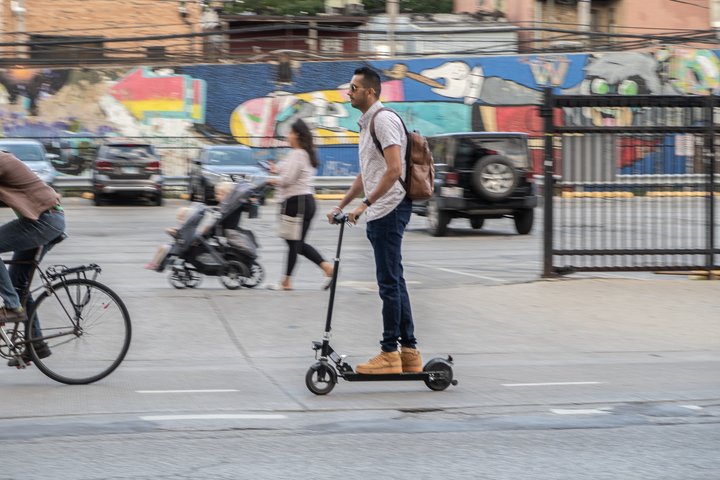The scooters are coming. Again.
Officials say four companies responded to the city’s request for applications for a second e-scooter sharing pilot this summer. Chicago selected Bird, Lime, and Spin to participate in this year’s program, which launches August 12.
2020 PROGRAM REQUIREMENTS
The terms reflect many of the recommendations from Active Trans’ E-Scooter Policy Report, which was released following the 2019 pilot.
- The companies can operate a combined 10,000 scooters in a geographic area that includes most of the city.
- Scooters are not allowed downtown or on the Lakefront or 606 trails, as Active Trans and our partners recommended.
- At least half of the scooters must be docked in low-income areas on the South and West Sides. We spoke with community leaders in these “priority zones” after the initial pilot and there’s strong support for maintaining this equity focus.
Active Trans also advocated for a requirement for scooters to be parked in docks or secured to public racks. The 2020 pilot includes this feature to try to keep the devices out of the public way. During the initial pilot, Active Trans and the city heard from many advocates for people with disabilities about issues with parking and riding on sidewalks.
2019 PILOT EVALUATION
Scooters proved to be a fun and popular way to get around. Chicagoans took more than 800,000 rides in the 4-month 2019 pilot.
City analysis shows, however, that more than half of these trips started and ended in the same place. These “joy rides” aren’t replacing car trips and don’t serve a clear transportation purpose.
The city’s equity requirements in the initial pilot yielded disappointing results. None of the 10 participating companies consistently met the requirement for 25 percent of scooters to be available in priority zones. The race and income of riders is not known, although survey data indicated riders tended to be whiter and wealthier.
Some trips replaced car and ride-hailing trips, but many also replaced walking, bike share, bus and train trips.
LOOKING AHEAD
Travel behavior changes during the pandemic have sparked disruption and consolidation in the e-scooter industry. This instability amplifies the challenges cities face in relying on private companies to meet resident’s transportation needs. Chicago’s public control of the Divvy bike share system remains a major benefit by comparison.
The most common word we hear in talking with Chicagoans who rode scooters is “fun.” There’s space in our region for more fun and sustainable alternatives to driving or riding alone in a car.
There’s also potential for the popularity of e-scooters to increase support for a more fair and equitable distribution of street space. But Chicago’s officials should be realistic about the e-scooters ability to help solve the city’s most pressing transportation challenges.
Not member of Active Trans? Please join us. People like you allow us to do the important of improving the sustainable transportation options in Chicagoland.

